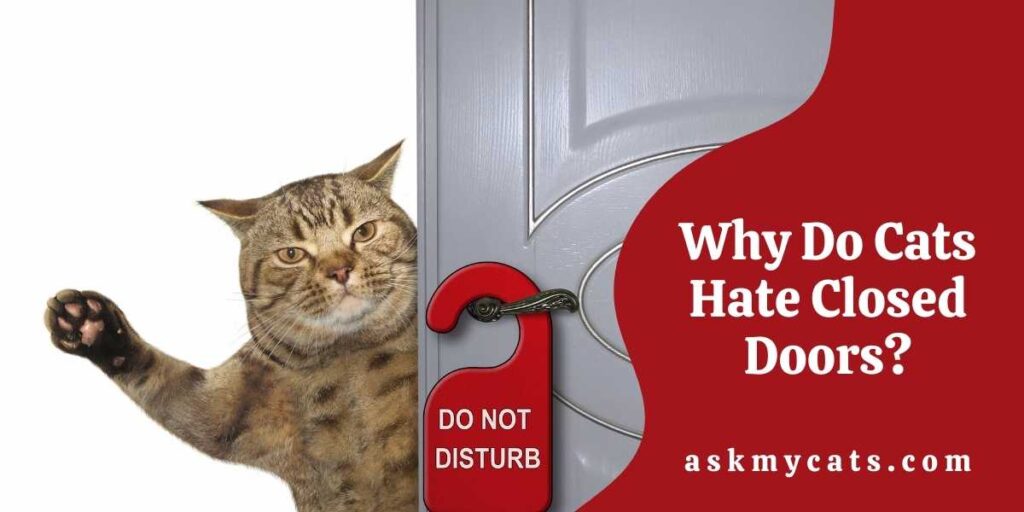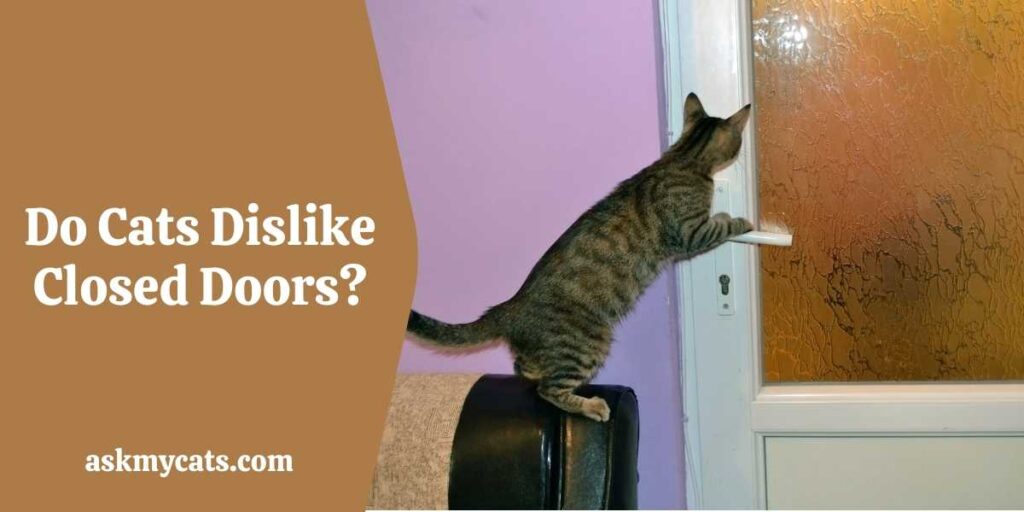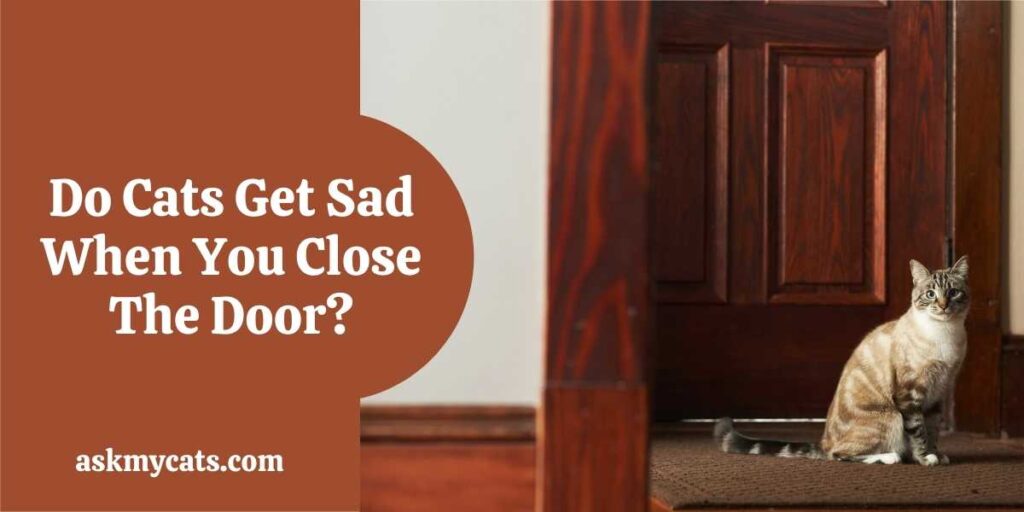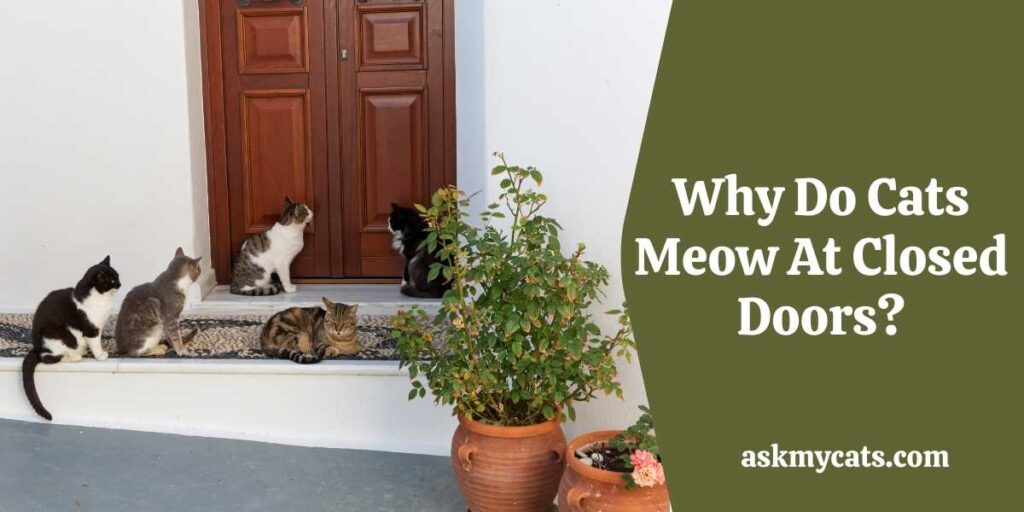Cats are known to despise closed doors, so you’re not alone if you have a door-hating kitty.
Understanding why cats are so adamant on testing locked doors is a bit more difficult. You’ll frequently find yourself opening a door just to have your cat peer over the corner, give the all-clear, and then return to the area they were previously in!
Most cats hate closed doors because they can’t abide being kept in the dark about what’s going on the other side of the door. It might possibly be connected to their intense feline urge to dominate and patrol territory.
Let’s take a deeper look at each cause, as well as some methods for dealing with your feline friend’s dissatisfaction with any locked door!


Give Your Cat the Perfect Day
Get the Free Ebook!
Do Cats Dislike Closed Doors?
Yes, cats hate closed doors.

Cats are typically thought of as independent creatures who prefer to live alone, but this is not the case.
Cats, like humans, appreciate being in your presence and enjoy receiving attention or simply hanging out with you. Who are we to say no to these perfect cuddles?
As a result, they want to be a part of whatever you’re doing, or at the very least know what you’re up to. If you’re hiding behind a closed door, they might not realise they’re missing out on a fun pastime with their special someone.
Our domestic cats might appear to be everything but wild at times. They may appear to have moved on altogether from their wild friends’ behaviours, with their fluffy beds, expensive litter boxes, and canned food.
However, nothing could be farther from the truth, and your cat’s natural instincts are still alive and well today. The need to dominate and police territory is one of the most powerful driving motivations.
A cat’s territory consists of a central area, or den, where it feels safe enough to sleep, eat, play, and maybe socialise with other cats. This is the centre of the territory, which is the region outside of the core that the cat actively protects against intruders.
That shut door indicates that there is an area of your cat’s territory where they are unaware of what is going on. Not only that, but their human friend has chosen to establish some authority over their domain for some reason!
The only reasonable course of action is to meow, scratch, and paw at the door until it closes.
Cats are sometimes stereotyped as being unsociable or even distant, but anybody who has a cat knows this isn’t always the case.
Cats are the only domesticated animals that have a history of living as solitary individuals. Many cats, like people, would spend most of their lives alone.
Do Cats Get Sad When You Close The Door?
Cats will get sad when you close the door.

Cats are smarter and wiser than dogs when it comes to defending their territory. They make as many marks as possible so that it’s always evident what they’re in charge of.
Even if you need to close a door to get to the toilet, your bedroom, or the kitchen, you may be overlooking the fact that the door effectively blocks access to a portion of the cat’s area.
That, of course, is an issue. So, if your cat meows, scratches, or fidgets, don’t be startled. It’s a matter of deciding where you want to live.
Why Do Cats Meow At Closed Doors?
Cats meow at closed doors because they want to know what’s happening on the other side.

Leaving doors open around your house allows your cat to feel more at ease in its surroundings.
They know they are not stuck if doors are open; they may join you whenever they choose as long as you are at home, and any disturbances within your house can be swiftly investigated.
They also know that they will always have access to food, drink, and, most crucially, their litter box, keeping them from getting hungry or having toilet-related accidents, which can be a headache to clean up.
Overall, having an open door policy at home will result in a happier, healthier, and less smelly cat.
Also, check out My Cat Keeps Meowing at the Door – Find Out Why!
How To Get Cat To Stop Meowing At Closed Door?
To stop the cat meowing at the closed door, make a cosy spot for your cat near to the window so that he gets to know what happens on the other side.
Giving cats the opportunity to view what happens beyond the closed front door is often enough to calm them down. They’ll be able to look out the window and watch you walk out, and they’ll know exactly where you are.
In certain circumstances, the cat’s heightened curiosity in what goes on behind closed doors has a significant impact on the amount of attention they receive. If they don’t spend enough time with their family, they may be more likely to protest closed doors because they feel abandoned.
Show your kitten how much you care by spending time with him or her, cuddling and playing with him or her, and he or she will understand that a closed-door is not a threat.
This is a more general answer, but cats who have a lot of toys to play with are less agitated and hence less likely to react to threats offered by a closed door. So provide your cat with his or her favourite items, such as boxes and bags in as many quantities as you like.
You may just toss them out when the cat becomes bored with them. When you add some toys to the mix, the cat will be too preoccupied with playing to notice the closed doors.
Why Do Cats Scratch At Closed Doors?
Cats scratch at closed doors because they’re curious.
Some people say cats are drawn to closed doors because they are inherently curious. Cats like investigating and exploring new things. It is no wonder that a closed door will promptly get their attention and entice them to find out what is going on behind them.
Cats who despise closed doors are a common occurrence. It is not an indication that your cat is ill or that she requires extra snuggling and playing time with you.
Of course, this may be true, but the fact is that they don’t give a damn about your privacy. They simply do not understand. Cats want to live in the realm between the open doors.
Cat experts believe that, despite their solitary lives in the wild, cats are still social animals. They form deep relationships with others and enjoy participating in all family activities.
Pawing at the locked door, from that perspective, displays nothing more than a desire to share every square inch of space with their owner.
Cats feel they own your house because of their territorial nature. It’s no surprise that many cats will try to open, scratch, or attack a closed door in any way they can. They may just see your attempt to shut a door as a sign that they are losing control of the area.
How Can I Get My Cat To Stop Scratching At The Door?
You have to train your cat not to scratch the door.
One of the reasons cats scratch at unwelcome surfaces is because you haven’t supplied them with stimulating activities.
Environmental enrichment is a method of modifying your cat’s environment to allow them to display their species-specific behaviour.
Your cat may explore vertical space in an expanded environment.
If feasible, include cat trees, scratch posts in strategic locations, a cat TV, and even a Catio (cat patio).
If your cat is clawing at the door because it is boring, attempt to make the environment more engaging.
This might also help with other concerns relating to conduct.
Frequently Asked Questions
Why do cats obsess over closed doors?
They detect an odour or hear something on the other side of the locked door, prompting them to explore. They regard the area beyond the door as part of their domain, which they feel compelled to patrol.
Do cats get used to closed doors?
Kitties despise locked doors, as any cat owner knows. When the door is shut, their inner alarm goes out, even if they are at their calmest. They meow, itch, fidget, and will not stop until that door is opened again.
Why does my cat hate being locked out of my room?
Many cats will become annoyed if the door locks while they are alone at night. Otherwise, they’re never alone and aren’t used to being separated from you!
Final Words
When you lock a door, it’s no mystery that many cats will try to open, scratch, or attack it in any way they can. They may just perceive your effort to shut a door as a signal that their entire control of the region is at risk.
Ask your questions in the comments section below.
